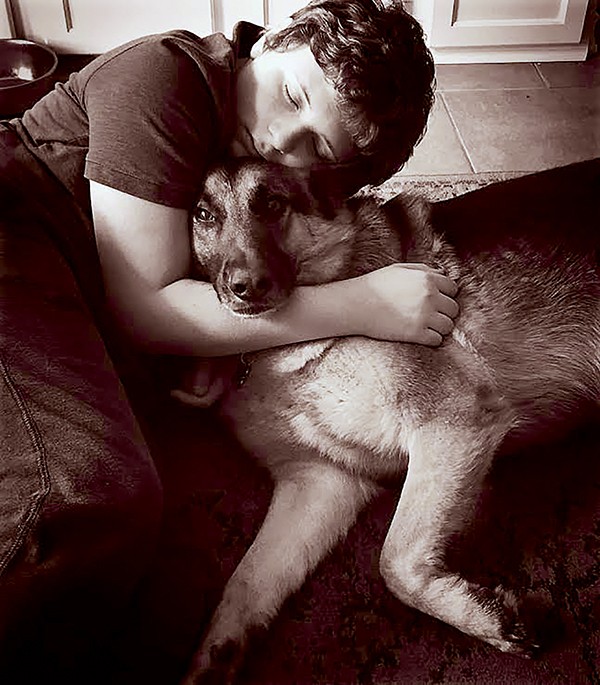Even with the stereo blasting inside of his mother Jeanne Goddard’s home, a dog’s bark from outside was enough to send Charlie Cantkier into a meltdown.
“He would scream, cry, and tell us his brain was going to explode from the pain,” Goddard said.
His hearing was sensitive enough that he’d experience severe sensory reactions to high-pitched yelping or deep growling from down the street. That was until he met Gus, a 12-week-old German shepherd service dog.
Charlie was born happy and healthy on Oct. 23, 2001. He weighed seven pounds and 14 ounces. For nearly a year, he met the milestones. But between the ages of 12 and 18 months, his abilities began to fade. Charlie lost the small bits of language he’d gained, and he stopped interacting with his family. By the age of 2, he suffered from behavioral issues and couldn’t speak. A doctor diagnosed Charlie with low-functioning, non-verbal autism when he was nearly 4 years old.

Charlie Cantkier and his dog Gus
“The doctor who diagnosed him told us we should give up our dreams for our child and face the reality that he will never say ‘I love you,’ never form relationships with siblings, family, or friends. He would never go to college, get married, or have a significant other, have kids or any of the typical things parents visualize their children doing eventually,” Goddard said. “But most disturbing was the doctor’s warning — that by the time Charlie reached puberty, we would have to institutionalize him.”
Goddard and her then-husband Mike Cantkier refused to accept the diagnosis. They tried everything — applied behavioral analysis therapy, biomedical interventions, and, after studying exposure therapy, Gus the service dog.
“I wondered if Charlie had a sweet, little puppy that he could grow with and live with and love, would this dampen his sensory reaction at all? I wanted their first meeting to be calm. … I put Gus on Charlie’s lap, and they absolutely and completely fell in love with each other,” Goddard said.
Dogs share a unique bond — an inherent “man’s best friend” connection — with their owners. Many dogs offer unconditional love. They are at the door after a long day of work, ready to hug or play. For some people, like Charlie, the connection is much deeper, says anthrozoologist John Bradshaw, author of Dog Sense and researcher of animal-human relations.
“Dogs instinctively form very strong attachments to people and find contact with the person they’re attached to intensely rewarding in its own right,” Bradshaw said. “[But] they are exquisitely sensitive to our body language, probably even more so than we ourselves are, and in that area they easily out-perform otherwise much more ‘intelligent’ animals, such as chimpanzees.”
The therapies and medical interventions helped Charlie recover from the various medical conditions causing his autistic-like behaviors — but he still faced debilitating sensory issues. Through caring for and bonding with his new friend Gus, Charlie experienced a 180-degree change in his quality of life. He no longer exhibited a deep fear of dogs and their barking.
Gus has stood by Charlie’s side for more than six years now, and his needs have drastically changed. At six years old, a doctor re-diagnosed Charlie with high-functioning, hyper-verbal autism with superior intelligence. At the age of 10, the same doctor diagnosed him with Asperger’s syndrome with superior intelligence.
Children don’t usually move on the autism spectrum, Goddard said. But Charlie, now 14, describes himself as a “typical” teenager. He’ll even start the next school year as a freshman at a mainstream high school.
“I knew this puppy would help me in life,” Charlie said. “Also he’s cute, so that’s a plus. I knew he would protect me and help me handle loud noises. If I feel sick, he helps me feel better.”
For Goddard, who watched her son’s autism abate through disciplined years of hard work and determination, she said it was Gus who helped shape Charlie into the teenager he’s become today.
“There was a time when Charlie was convinced dogs were evil,” Goddard said. “Now he talks about starting a business where he makes stuffed animals that are replicas of people’s pets. He has gained this empathy and nurturing nature when it comes to dogs and other animals — and that’s 100 percent because of his relationship and bond with Gus.”